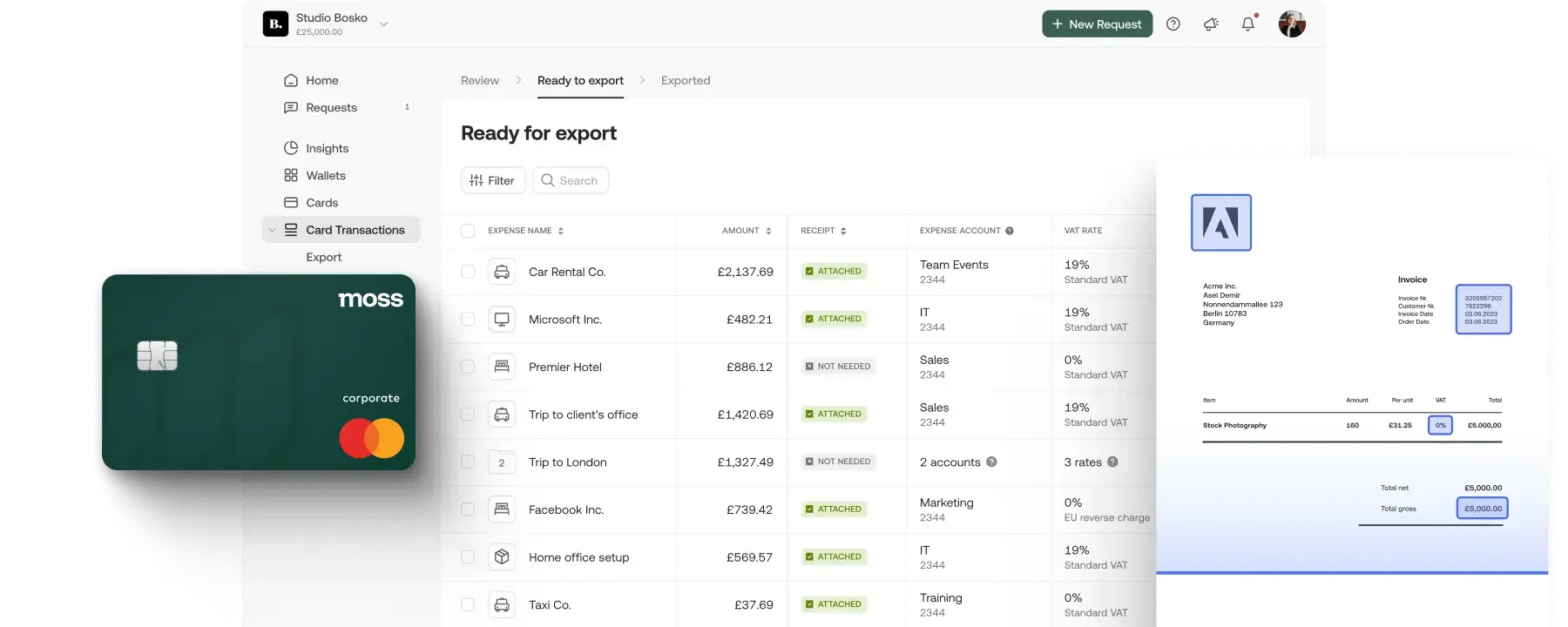Companies cannot thrive without investing. This also means providing a budget for building and maintaining client relations on business trips or visiting other company sites. Booking and keeping track of business-related expenses can be hard, though—unless establishments rely on smart solutions and service providers that are specialised in helping with business travel management.
What is business travel management?

When talking about business travel management, we need to think of the controlling, tracking and reporting aspects that come with business travel. Employees who are responsible for this task are called corporate or business travel managers. They take care of creating an internal spending policy, help with booking national and international trips and make sure that teams work within their respective budget.
To be clear: the team responsible for business travel management is not just or necessarily the company’s own travel agency. While it might be part of their job to find good deals on plane tickets or hotels for the upcoming business trip of an employee, their job is much more complex. It also involves managing and controlling budgets to ensure that employees don’t spend too much of the company’s travel budget.
What are travel expenses?
The abbreviation T&E stands for “Travel & Expense“ and it includes all costs that usually are related to a business trip. Payments can be made via a company’s corporate card or by each individual, who then gets reimbursed later in the process.
- Tickets (plane, rail, boat, ferry and other public transport)
- Taxi fares, car rentals and petrol
- Accommodation (hotel, hostel, Airbnb i.e.)
- Client meals
- Client gifts
- Gratuities
- Supplies
- Necessary services (security and more)
A sound T&E management system should therefore show the spending and allow quick reimbursement for employees that have paid necessary corporate expenses out of their own pockets. Nevertheless, it should also help determine easily whether the submitted expenses comply with company policy.
In general, T&E takes up ten per cent of a company’s annual budget. At the same time, it is very hard to control since businesses need to stay flexible and allow for spontaneous travelling and therefore also higher last-minute fares and rates. But as with all other corporate expenses, it is possible to reduce the costs tremendously if you know what to look out for.
Challenges of business travel management
Travel expenses can go through the roof easily due to the individual needs of each employee. This is what makes them very unpredictable for businesses. Setting up some ground rules, therefore, is an important step to keep costs at bay. Management can decide who will be allowed business class tickets or even flights in general. Other standards might be set for the quality of accommodation, the amount of cash available or handing out a credit or debit card with a certain limit to pay for any costs which may arise during a business trip. Adhering to and enforcing the company policy, is the job of a business travel manager or the people responsible for business travel management tasks.
Another thing to keep in mind: Occurring travel expenses should always be matched with an employee and a certain event to not cause trouble for accounting. With small amounts being paid in private cash and flights or hotel bookings purchased via the collectively used corporate credit card, this becomes a challenging task. Offering all employees their own virtual and physical cards can solve this problem. Even coffee with a client can be paid cashless, and the employee’s expense is transparently shown in the budget overview.
Why business travel management is crucial

Simplicity, visibility and a centralised way of managing business travel expenses are key when trying to save money. So, the first step to reducing costs is to switch to a management tool that helps gather all information in one place than storing it in Excel sheets, local computer files or even bookshelves. The second step is to automate processes to avoid manual data entry whenever possible. Why? The answer is easy: Human errors occur even in the most meticulous working companies, especially when it comes to adhering to the company’s travel expense policy. This makes it more difficult to keep track of the actual costs.
Automation has another benefit: Whoever is responsible for checking T&E can get an overview of the budget and spending in real-time. Teams, CFOs or CEOs who like to lower company expenses then are most likely surprised at how high the amount for business travel really is—and which expenses actually don’t comply with company policy.
Business travel management will help you:
- find and negotiate better deals for tickets, accommodation and more with providers
- provide help and organisational support during business trips
- detect human data errors, possible fraud, and duplicate invoices
- set up a company policy for business travel spending
- approve expenses that comply with company policy
- determine which payments are allowed to be made with corporate cards
- match different expenses of each employee and trip
- digitise and organise your T&E
If a small or medium-sized company has a business travel manager, they might work closely with Finance, Accounting, HR and several other administrative teams. Big enterprises can also shift the task to a business travel management company. Especially globally acting businesses might benefit from outsourcing the issue to a renowned company, as it can be helpful with negotiating better prices for accommodation and airline tickets.
Moreover, business travel management companies can work with an online booking tool available for employees that might even be available via an app. On top of that, they offer consultations and reporting, program management services, exclusive travel assistance for executive staff, and support with meetings and events. Of course, this service comes at a price, which is why smaller businesses tend to take matters into their own hands and simply use corporate booking and management solutions provided by external businesses. Those should ideally work hand in hand with company systems and cloud-based services to assure real-time tracking and merging of all data in the most convenient way possible.
The best business travel management solutions for SMEs

Nowadays, small and medium-sized enterprises (SMEs) have several management options to choose from. Ideally, providers and services have a modular approach, so businesses only have to pay for the solution they actually need. Here are a few smart solutions that every SME will profit from.
Moss
Moss functions as a holistic solution for businesses that are facing corporate expense management challenges and wish to provide an unlimited number of virtual and corporate cards (with fixed budgets) to employees. All data is compiled automatically to give real-time insights. This way, business travel management becomes significantly easier to handle.
TravelPerk
With TravelPerk, employees and business travel managers can book flights or accommodation via their platform. It has a variety of offers to choose from so comparing prices to adhere to company policy really is a piece of cake.
CT Business Travel
Even if a company is not a big player like Apple or Amazon: As many small or medium-sized businesses are connected to suppliers and clients from around the world, representatives need to travel globally. CT Business Travel is a company that helps find the best offers and excellent customer support when travelling globally.
Fello
Fello is also a business travel company with a focus on outstanding service. Travellers, as well as travel managers, can rely on great corporate discounts, a well-planned itinerary and even passport and visa services if needed.
Ace Travel Management
Companies with a focus on climate-conscious travelling can choose the services of Ace Travel Management. The company also offers 24-7 support with policy planning, data reports on expenditure, reservations and the actual trip.
The perfect travel companion: make payments with corporate cards from Moss

Moss provides the perfect solution for small and medium-sized companies with the need to optimise their business travel management. Our service combines solutions for all corporate travel management challenges—including the use of personalised corporate cards as a means of payment for employees. With Moss, companies can give out as many cards as needed, create virtual cards for one-time payments and set individual limits which comply with company policy. This is secure travel spending made easy, all while following the new work approach on more simplicity, trust, and transparency in the workplace.
But that is not all: Moss also helps with expense reimbursement as well as invoice management. And since keeping track of expenses is crucial, Moss delivers valuable insights on T&E to decide the next steps and where costs can be reduced effectively. Say goodbye to time-consuming expense reports, manual data entry, and annoying approval processes—if you choose to. Because Moss’ greatest feature might be its flexibility: Our modular service enables businesses to compile and customise the (travel) management software to provide them exactly with what they require. This means no unnecessary or hidden expenses when trying to cut costs in the first place.
FAQs
Business travel management includes tasks like controlling, tracking and reporting expenses related to business trips. Respective managers set up a company policy which determines ground rules such as spending limits, so teams do not overspend and companies can reduce costs.
Every business should set individual boundaries on travel expenses to keep costs at bay. This can include price limits, a maximum star rating for hotels, or restricting business flights for executives only. Moreover, it is necessary that payments can be matched with employees and their trips to support accounting.
The greatest benefits of business travel management are reducing costs by choosing corporate deals, strictly adhering to company policy, and keeping track of expenses. Moreover, it is possible to detect fraud and human errors by having transparent access to all information related to travelling expenses.
Many employees appreciate the possibility to plan their business trips by themselves instead of having to follow a predetermined itinerary. Giving out virtual and/or physical cards to every employee who needs them to pay for the upcoming expenses allows them to plan independently. Simultaneously, companies appreciate the simplicity as every payment is automatically matched to a trip and colleague.
Some companies don’t have business travel managers or like to outsource the tasks to external companies. They take care of planning business trips, can give employees access to booking tools and create insights for executives. Moreover, they offer full support before, during and after a business trip.
Plane tickets, fares for public transport and taxis, as well as car rentals and petrol, are typical expenses on business trips. Companies usually also pay for business-related accommodation in hotels or Airbnbs, client meals, supplies, and other necessary services or purchases.







